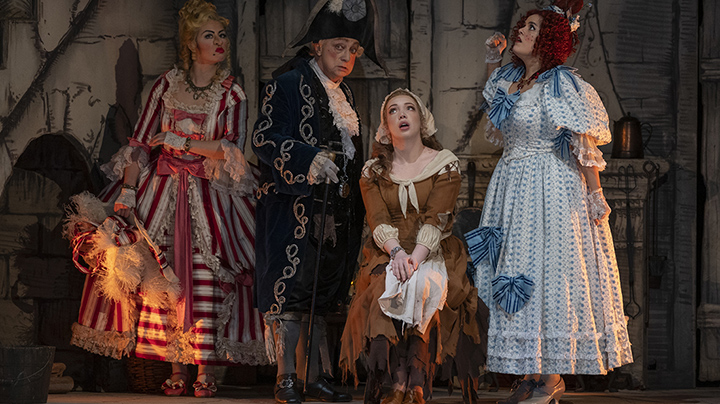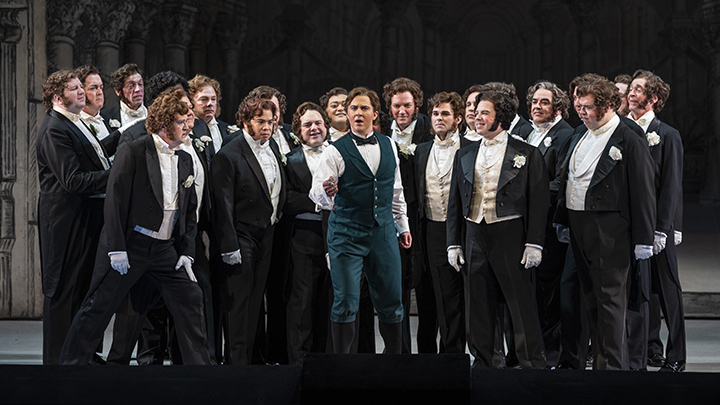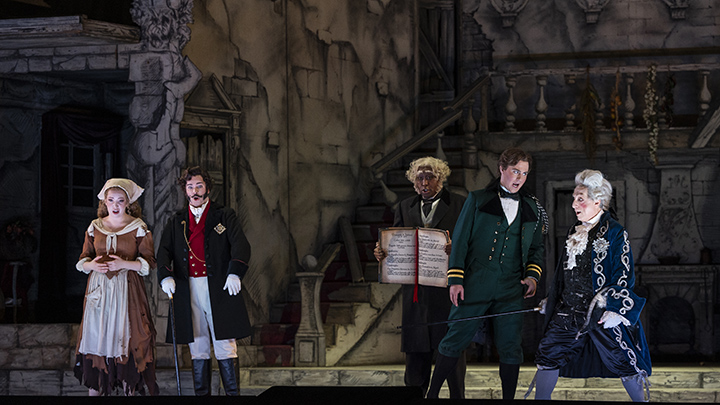Here, they won’t find a Fairy Godmother, mice, pumpkin coaches or a glass slipper (though there is a matching bracelet). Instead, they will find a very human version of the story that looks at the nature of happiness and forgiveness housed in Rossini’s comic opera. We still have a happy ending, of course, but the Jean-Pierre Ponnelle production featuring an ornate sepia/gray toned set and colorfully delicious costumes tells the tale like a direct transfer from a storybook.
Rossini’s charming, bubbly score features some of his most pleasant music. As Prince Ramiro, seeking a potential wife at the home of Don Magnifico, sends his servant Dandini in disguise as himself while he plays the servant, so that Dandini can gauge the daughters of Magnifico. But when Ramiro meets the servant girl Cenerentola, he is immediately smitten and knows that he has found his future wife. Meanwhile, Magnifico is presenting his ungainly daughters to the disguised Dandini in a hilarious scene on a red carpet in which the girls’ outrageous attempts at seduction fail miserably.
Cenerentola is refused when she asks to go to the prince’s ball, but her godfather Alidoro, the Prince’s tutor, arranges for her to have beautiful clothes and attend the ball. After all the masquerade is over, the Prince and Cenerentola marry, and she forgives Magnifico and his daughters for their cruel treatment and brings them in to be part of the family.
Conductor Yi-Chen Lin leads a fast-paced, propulsive, precise reading of Rossini’s intricate (if occasionally repetitive) score and is very sensitive to the singers’ needs and the precise orchestra playing. The men’s chorus under Michael Black perform splendidly, both vocally and in their choreography.
The cast is led by two Lyric debutantes, tenor Jack Swanson as Prince Ramiro and Russian-born mezzo Vasilisa Berzhanskaya as Angelina (Cenerentola). Swanson has the perfect Rossini tenor voice: light, flexible, and capable of stratospheric high notes, which he unleashed with gusto particularly in his second-act aria “Si, ritrovarla io guiro”. He strikes a handsome figure, and his demeanor suggests a man capable of both strong leadership and passionate love. We certainly hope to hear more from Swanson at Lyric Opera.
Ms. Berzhanskaya started quietly, almost inaudible in her first piece, but soon warmed to give a full-voiced performance, especially in the duets. She has a vast range, particularly in her middle and upper registers, though her lowest notes were occasionally lost in the orchestra. She brings a very down-to-earth approach to the character, with clear goals and, happily, little self-pity. She has great chemistry with Swanson, and the two make a most attractive couple. I did think that her approach cost some of the character’s charm and sparkle, but it was a strong, effective performance.
The wonderful buffo baritone Alessandro Corbelli, so effective in last season’s “Daughter of the Regiment,” is equally delightful here with many more comic opportunities that he plays to the hilt. He manages to be hilarious as the ever-suffering Don Magnifico without going too far into farce. He sings very well, indeed, and brings a solid presence. The two sisters, Clorinda and Tisbe, are played with effective nastiness by Teresa Castilloand Sophia Maekawa, and though their physical business sometimes goes “over the top,” they have fine voices and excellent comic timing.
Canadian baritone Joshua Hopkins is a blustery yet suave Dandini, especially when disguised as the Prince and dealing with the sisters’ antics. He sings with beauty and style, even in the faster passages. Alidoro is played with stentorian relish by the superb bass-baritone Nicholas Newton. Kudos should also go to revival director Gregory A. Fortner, who kept the action and business moving and clever.
Ponelle’s classic sets and costumes add much verve to the production. Duane Schuler’s lighting works most of the time, though there were some odd dark areas of the stage, particularly around the sisters’ bedrooms. One thing felt odd about the production: once in each act, the red curtain fell so as to have scenes in front of the curtain while the set was changed. Unfortunately, both times the audience thought the act was over and a number of people left their seats.
Nevertheless, the audience seemed to have a wonderful time, and produced ovations at the boisterous curtain call. Rossini was very well served on Sunday afternoon.
Photo: Michael Brosilow






